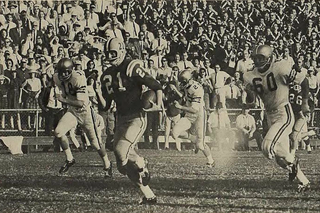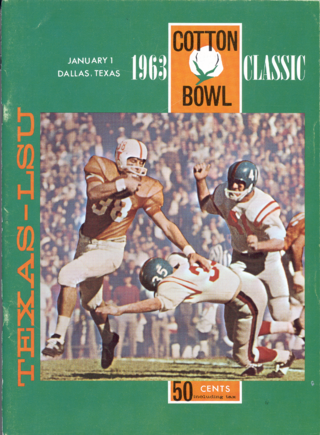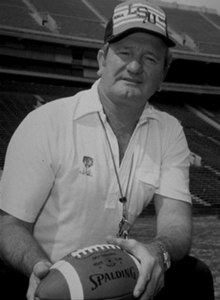The NCAA was without a playoff for the major college football teams in the University Division, later known as Division I-A, during the 20th century. The NCAA recognizes Division I-A national champions based on the final results of polls including the "wire service", FWAA and NFF. The 1964 AP poll continued to rank only ten teams, compiling the votes of 55 sportswriters, each of whom would give their opinion of the ten best. Under a point system of 10 points for first place, 9 for second, etc., the "overall" ranking was determined.

Jerry Lane Stovall , nicknamed "Mr. Everything", is an American former football player, coach, and college athletics administrator. He played college football for the LSU Tigers, where he was a unanimous selection to the 1962 College Football All-America Team as a halfback. Stovall played professionally as a safety and punter in the National Football League (NFL) with the St. Louis Cardinals from 1963 to 1971. Stovall served as the head football coach at his alma mater, LSU, from 1980 to 1983, compiling a record of 22–21–2 in four seasons and leading the 1982 team to an appearance in the 1983 Orange Bowl. He was the athletic director at Louisiana Tech University from 1990 to 1993. He is the only player in LSU history to be named a unanimous All-American (1962), be selected to the college football hall of fame (2010), be selected as a first round pick (1963), and to be selected to the pro bowl.
Gerard Paul DiNardo is an American former football player and coach. He played college football as a guard for the Notre Dame Fighting Irish where he was selected as an All-American in 1974. DiNardo served as the head football coach at Vanderbilt University (1991–1994), Louisiana State University (1995–1999), and Indiana University (2002–2004), compiling a career college football record of 59–76–1. In 2001, he was the head coach of the Birmingham Thunderbolts of the XFL.

The LSU Tigers football program, also known as the Fighting Tigers, represents Louisiana State University in college football. The Tigers compete in the Football Bowl Subdivision (FBS) of the National Collegiate Athletic Association (NCAA) and the Western Division of the Southeastern Conference (SEC).

Paul Franklin Dietzel was an American college football player, coach, and athletics administrator. He served as the head coach at Louisiana State University (1955–1961), the United States Military Academy (1962–1965), and the University of South Carolina (1966–1974), compiling a career head coaching record of 109–95–5. Dietzel's 1958 LSU team concluded an 11–0 season with a win over Clemson in the Sugar Bowl and was a consensus national champion. For his efforts that year, Dietzel was named the National Coach of the Year by both the American Football Coaches Association and the Football Writers Association of America. Dietzel also served as the athletic director at South Carolina (1966–1974), Indiana University Bloomington (1977–1978), LSU (1978–1982), and Samford University (1985–1987).

The Alabama Crimson Tide football program represents the University of Alabama in the sport of American football. The team competes in the Football Bowl Subdivision (FBS) of the National Collegiate Athletic Association (NCAA) and the Southeastern Conference (SEC). The team is currently led by Kalen DeBoer. The Crimson Tide is among the most storied and decorated football programs in NCAA history. Since beginning play in 1892, the program claims 18 national championships, including 13 wire-service national titles in the poll-era, and five other titles before the poll-era. From 1958 to 1982, the team was led by Hall of Fame coach Paul "Bear" Bryant, who won six national titles with the program. Alabama then had a dominant run under head coach Nick Saban between 2007 and 2023, resulting in six further national titles. The team's rallying cry is "Roll Tide!".

The Arkansas Razorbacks football program represents the University of Arkansas in the sport of American football. The Razorbacks compete in the Football Bowl Subdivision (FBS) of the National Collegiate Athletic Association (NCAA) and is a member of the Southeastern Conference (SEC). Home games are played at stadiums on or near the two largest campuses of the University of Arkansas System: Donald W. Reynolds Razorback Stadium in Fayetteville and War Memorial Stadium in Little Rock. Sam Pittman is the head coach and has served since 2020.

The 2008 Ole Miss Rebels football team represented the University of Mississippi during the 2008 NCAA Division I FBS football season. The team's head coach was Houston Nutt, who served his first season in the position and replaced Ed Orgeron, who was fired after accumulating a 10–25 record at Ole Miss from 2005 to 2007. The Rebels played their seven home games in 2008 at Vaught–Hemingway Stadium in Oxford, Mississippi.
The 1987 Sugar Bowl was the 53rd edition of the college football bowl game, played at the Louisiana Superdome in New Orleans, Louisiana, on Thursday, January 1. Part of the 1986–87 bowl game season, it featured the fifth-ranked LSU Tigers of the Southeastern Conference (SEC) and number 6 Nebraska Cornhuskers of the Big Eight Conference. Favored Nebraska trailed early and won, 30–15.

Michael Ray Mangham was an American football player for the LSU Tigers from 1958 to 1960. He played at the end position on both offense and defense and was selected as an Academic All-America and All-SEC player. He is most remembered for catching the winning touchdown pass in the Sugar Bowl on January 1, 1959, to give LSU the national championship for the 1958 college football season.

The 1963 Cotton Bowl Classic was the 27th edition of the college football bowl game, played at the Cotton Bowl in Dallas, Texas, on Tuesday, January 1. Part of the 1962–63 bowl game season, the game featured the fourth-ranked Texas Longhorns of the Southwest Conference (SWC) and the #7 LSU Tigers of the Southeastern Conference (SEC). LSU shut out the Longhorns, 13–0.
The 1974 Orange Bowl was the fortieth edition of the college football bowl game, played at the Orange Bowl in Miami, Florida, on Tuesday, January 1. The final game of the 1973–74 bowl season, it matched the sixth-ranked independent Penn State Nittany Lions and the #13 LSU Tigers of the Southeastern Conference (SEC).
The 1962 Orange Bowl was the 28th edition of the college football bowl game, played at the Orange Bowl in Miami, Florida, on Monday, January 1. Part of the 1961–62 bowl game season, the No. 4 LSU Tigers of the Southeastern Conference (SEC) defeated the No. 7 Colorado Buffaloes of the Big Eight Conference, 25–7.

The 1961 LSU Tigers football team was an American football team that represented Louisiana State University (LSU) as a member of the Southeastern Conference (SEC) during the 1961 college football season. In their seventh and final year under head coach Paul Dietzel, the Tigers compiled a 10–1 record, tied with Alabama for the SEC championship, and were ranked No. 3 in the final UPI coaches poll and No. 4 in the final AP writers poll. After losing the season opener to Rice, The Tigers won 10 consecutive games, including a 10–0 victory over No. 3 Georgia Tech, a 10–7 victory over No. 2 Ole Miss, and a 25–7 victory over No. 7 Colorado in the 1962 Orange Bowl. They shut out five opponents, outscored all opponents by a total of 234 to 50, and ranked fourth nationally in both scoring defense and rushing defense.
The 1965 LSU Tigers football team was an American football team that represented Louisiana State University (LSU) as a member of the Southeastern Conference (SEC) during the 1965 NCAA University Division football season. In their fourth year under head coach Charles McClendon, the Tigers complied an overall record of 8–3 with a conference record of 3–3 the SEC, placing in a three-way tie for sixth place in the SEC.
The 1975 LSU Tigers football team represented Louisiana State University (LSU) as a member of the Southeastern Conference (SEC) during the 1975 NCAA Division I football season. Led by 14th-year head coach Charles McClendon, the Tigers compiled an overall record of 5–6, with a mark of 2–4 in conference play, and finished tied for sixth in the SEC.
The 1980 LSU Tigers football team represented Louisiana State University (LSU) as a member of the Southeastern Conference (SEC) during the 1980 NCAA Division I-A football season. Led by first-year head coach Jerry Stovall, the Tigers compiled an overall record of 7–4, with a mark of 4–2 in conference play, and finished tied for fourth in the SEC.
The 1979 Tangerine Bowl was an American college football bowl game that was played on December 22, 1979 at Orlando Stadium in Orlando, Florida. The game matched the LSU Tigers against the Wake Forest Demon Deacons. It was the final contest of the 1979 NCAA Division I-A football season for both teams. The game ended in a 34–10 victory for the Tigers.
The LSU Tigers football team represents Louisiana State University in the sport of American football. The university has fielded a team every year since it began play in 1893, except in 1918 due to World War I. It has competed in the Southeastern Conference (SEC) since 1933, and in the conference's Western division since 1992. Previously, LSU was a member of the Southern Intercollegiate Athletic Association (SIAA) from 1896 to 1921 and the Southern Conference (SoCon) from 1922 to 1932. There have been 32 head coaches for the team, starting with Charles E. Coates in 1893. Since 2022, the head coach of the Tigers is Brian Kelly. LSU has played 1,221 games in its 123 seasons of play, and has compiled an all-time record of 772 wins, 405 losses, and 47 ties as of the end of the 2016 season.









